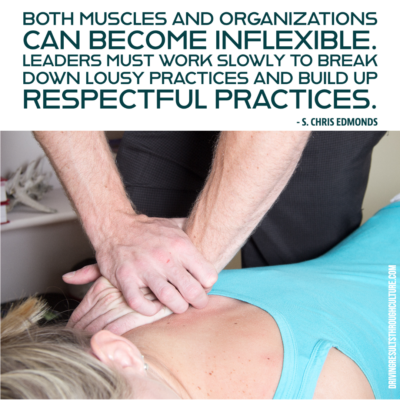I’m old. Over the years, back and neck pain caused me to hold my neck & shoulders & back very tightly – so moving wouldn’t hurt. Those tight muscles learned to be inflexible and immovable – so I wouldn’t hurt.
Muscles are incredibly powerful. If they learn to be inflexible and immovable, they act like bones – firm and solid. That firmness causes muscles to adhere to other muscles (for greater inflexibility) which compresses nerves.
The result was a pinched nerve in my neck. Two surgeries in the last two years helped reduce the pain but my hands still didn’t work right. My neurosurgeon said to find a good chiropractor.
I found Dr. Eric. He’s been working on getting my neck and shoulder and back muscles to let go. He’s working to release those adhesions for greater strength and flexibility. His efforts have made my hands work better!
The thing is – he couldn’t fix my muscles in one visit. It’s taken 27 weekly visits so far – and we’re not done yet.
So, Dr. Eric makes changes a little at a time. He’s releasing muscles and retraining muscles. Slowly, the muscles learn to trust the “new normal,” working together rather than binding together.
Changing the nature of a work culture requires the same approach.
Just as muscles can become inflexible, organizations can become inflexible. Systems that made sense in the ’70s may not serve well today. Policies and procedures drafted decades ago may not enable the nimbleness needed to wow your customers now.
Leadership beliefs that are embedded in the autocratic, command-and-control Industrial Age do not inspire employees of any generation.
Many of our organizations – and our leaders – are stuck . . . immovable and inflexible.
Just like Dr. Eric, leaders must work steadily and slowly to break down lousy structures and practices and build up respectful and validating practices.
Some leaders might start with modifying policies and practices that pit people against each other.
Others might begin mentoring leaders who rely on bullying to “inspire” results.
Don’t wait. Begin the subtle refinements that will build clarity, commitment, and cohesion across your organization to sustain a work culture where respect is as important as results.
This is episode one hundred of my Culture Leadership Charge video series. In these concise videos, I share proven practices for building and sustaining a purposeful, positive, productive culture – where good comes first.
You’ll find my Culture Leadership Charge and Good Comes First episodes and more on my YouTube, iTunes, and Amazon Podcast channels. If you like what you learn, please subscribe.
Have you responded to this month’s culture leadership poll? Add your ratings to two questions. It’ll take less than a minute. Once you vote, click “results” to see the responses from around the globe.



